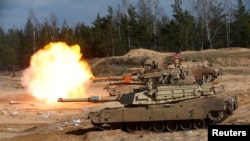On January 19, former Russian president Dmitry Medvedev, commenting on Western plans to provide Ukraine with tanks, asserted that nuclear powers have never lost major conventional wars:
"Tomorrow, at NATO's Ramstein base, the great military leaders will discuss new tactics and strategies, as well as the supply of new heavy weapons and strike systems to Ukraine,” Medvedev wrote on Telegram.
He asserted, using italics for emphasis:
“[A] nuclear power's defeat in a conventional war can provoke the outbreak of a nuclear war. The nuclear powers have not lost major conflicts on which their fate depends."
That assertion is false. Several countries with nuclear arsenals have suffered defeats in major military conflicts but have not resorted to using to nuclear weapons.
The U.S. lost the Vietnam War, a proxy war with the Soviet Union, but did not use nuclear weapons
In the 1955-1975 Vietnam War, South Vietnam, backed by the United States and several of its allies, fought communist North Vietnam and allied Viet Cong forces in South Vietnam, who were backed by the Soviet Union and China.
According to Encyclopedia Britannica, “the war was also part of a larger regional conflict and a manifestation of the Cold War between the United States and the Soviet Union and their respective allies.”
While the U.S. troop presence in Vietnam peaked at more than 500,000 in 1969, American public support for U.S. involvement gradually dropped. A January 1967 Gallup poll found that 32 percent of Americans considered U.S. involvement in the war a mistake, with that number rising to 46 percent in a February 1968 poll. In January 1970, a majority of Gallup poll respondents (57 percent) said that sending U.S. troops to Vietnam had been a mistake.
In 1969, then U.S. president Richard Nixon began a gradual withdrawal of U.S. troops from Vietnam, all of which were pulled out by March 1973.
On April 30, 1975, North Vietnamese forces seized South Vietnam’s capital, Saigon, marking the end of the war and the reunification of Vietnam under communist rule.
China lost a border war with Vietnam in 1979
Two formerly allied communist countries, China and Vietnam, fought a short but significant border war in February-March 1979.
In 1978, China invaded Cambodia in response to Vietnamese actions against the Khmer Rouge, the Beijing-backed communist group that ruled Cambodia from 1975 to 1979.
Then, in February 1979, 220,000 Chinese troops crossed into Vietnam and captured several Vietnamese border towns.
According to Western estimates, 26,000 Chinese and 30,000 Vietnamese troops were killed in the ensuing fighting, while 37,000 Chinese and 32,000 Vietnamese troops were wounded.
On March 6, 1979, China declared “victory” and withdrew its troops from Vietnam, stating that its punitive mission had been accomplished.
Still, according to the Hoover Institution, a Stanford, California think tank, China in fact lost that border war, having failed to achieve its strategic objective of forcing Vietnamese troops to withdraw from Cambodia. Vietnam overthrew the Khmer Rouge and installed a puppet government in Cambodia, and only withdrew its forces from Cambodia in 1989.
The Soviet Union lost the Afghan war, a proxy war with the U.S., and did not use nuclear weapons
The Soviet Union invaded neighboring Afghanistan in December 1979, to aid the Afghan communist government in its conflict with anti-communist Muslim guerrillas known as the mujahideen.
The Soviet invasion forces, numbering 105,000-115,000, seized control of Afghanistan’s cities, large towns and large garrisons, but the mujahideen controlled the countryside.
During the ensuing nine years of warfare, the mujahideen received support from Iran, Pakistan, Saudi Arabia, China and, most significantly, the United States. Indeed, the Soviet-Afghan war is widely seen as a Cold War proxy battle between the United States and the Soviet Union.
The U.S. Central Intelligence Agency conducted a large-scale operation to arm and finance the mujahideen. The Washington Institute for Near East Policy, a Washington, D.C. think tank, estimated that U.S. aid to the Afghan fighters came to $630 million annually.
According to official Soviet estimates, 14,500 Soviet soldiers died in the Afghan war, along with 18,000 Afghan government soldiers and 90,000 mujahideen fighters. Estimates of the civilian death toll range from 500,000 to 1.5 million.
The Encyclopedia Britannica describes the invasion of Afghanistan's disastrous consequences for the Soviet Union:
“The war in Afghanistan became a quagmire for what by the late 1980s was a disintegrating Soviet Union… Despite failing to implement a sympathetic regime in Afghanistan, in 1988 the Soviet Union signed an accord with the United States, Pakistan, and Afghanistan and agreed to withdraw its troops. The Soviet withdrawal was completed on February 15, 1989, and Afghanistan returned to nonaligned status.”





